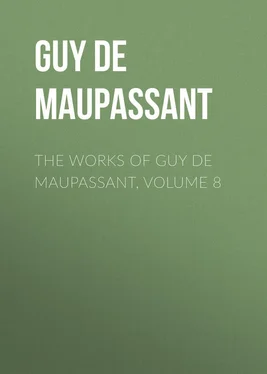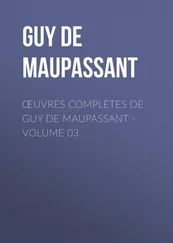Guy Maupassant - The Works of Guy de Maupassant, Volume 8
Здесь есть возможность читать онлайн «Guy Maupassant - The Works of Guy de Maupassant, Volume 8» — ознакомительный отрывок электронной книги совершенно бесплатно, а после прочтения отрывка купить полную версию. В некоторых случаях можно слушать аудио, скачать через торрент в формате fb2 и присутствует краткое содержание. Жанр: literature_19, foreign_antique, foreign_prose, на английском языке. Описание произведения, (предисловие) а так же отзывы посетителей доступны на портале библиотеки ЛибКат.
- Название:The Works of Guy de Maupassant, Volume 8
- Автор:
- Жанр:
- Год:неизвестен
- ISBN:нет данных
- Рейтинг книги:4 / 5. Голосов: 1
-
Избранное:Добавить в избранное
- Отзывы:
-
Ваша оценка:
- 80
- 1
- 2
- 3
- 4
- 5
The Works of Guy de Maupassant, Volume 8: краткое содержание, описание и аннотация
Предлагаем к чтению аннотацию, описание, краткое содержание или предисловие (зависит от того, что написал сам автор книги «The Works of Guy de Maupassant, Volume 8»). Если вы не нашли необходимую информацию о книге — напишите в комментариях, мы постараемся отыскать её.
The Works of Guy de Maupassant, Volume 8 — читать онлайн ознакомительный отрывок
Ниже представлен текст книги, разбитый по страницам. Система сохранения места последней прочитанной страницы, позволяет с удобством читать онлайн бесплатно книгу «The Works of Guy de Maupassant, Volume 8», без необходимости каждый раз заново искать на чём Вы остановились. Поставьте закладку, и сможете в любой момент перейти на страницу, на которой закончили чтение.
Интервал:
Закладка:
Talent is long patience.
Everything you want to express must be considered so long, and so attentively, as to enable you to find some aspect of it which no one has yet seen and expressed. There is an unexplored side to everything, because we are wont never to use our eyes but with the memory of what others before us have thought of the things we see. The smallest thing has something unknown in it; we must find it. To describe a blazing fire, a tree in a plain, we must stand face to face with that fire or that tree, till to us they are wholly unlike any other fire or tree. Thus we may become original.
Then, having established the truth that there are not in the whole world two grains of sand, two flies, two hands, or two noses absolutely alike, he would make me describe in a few sentences some person or object, in such a way as to define it exactly, and distinguish it from every other of the same race or species.
"When you pass a grocer sitting in his doorway," he would say, "a porter smoking his pipe, or a cab stand, show me that grocer and that porter, their attitude and their whole physical aspect, including, as indicated by the skill of the portrait, their whole moral nature, in such a way that I could never mistake them for any other grocer or porter; and by a single word give me to understand wherein one cab horse differs from fifty others before or behind it."
I have explained his notions of style at greater length in another place; they bear a marked relation to the theory of observation I have just laid down. Whatever the thing we wish to say, there is but one word to express it, but one verb to give it movement, but one adjective to qualify it. We must seek till we find this noun, this verb, and this adjective, and never be content with getting very near it, never allow ourselves to play tricks, even happy ones, or have recourse to sleights of language to avoid a difficulty. The subtlest things may be rendered and suggested by applying the hint conveyed in Boileau's line:
"D'un mot mis en sa place enseigna le pouvoir." "He taught the power of a word put in the right place."
There is no need for an eccentric vocabulary to formulate every shade of thought – the complicated, multifarious, and outlandish words which are put upon us nowadays in the name of artistic writing; but every modification of the value of a word by the place it fills must be distinguished with extreme clearness. Give us fewer nouns, verbs, and adjectives, with almost inscrutable shades of meaning, and let us have a greater variety of phrases, more variously constructed, ingeniously divided, full of sonority and learned rhythm. Let us strive to be admirable in style, rather than curious in collecting rare words.
It is in fact more difficult to bend a sentence to one's will and make it express everything – even what it does not say, to fill it full of implications of covert and inexplicit suggestions, than to invent new expressions, or seek out in old and forgotten books all those which have fallen into disuse and lost their meaning, so that to us they are as a dead language.
The French tongue, to be sure, is a pure stream, which affected writers never have and never can trouble. Each age has flung into the limpid waters its pretentious archaisms and euphuisms, but nothing has remained on the surface to perpetuate these futile attempts and impotent efforts. It is the nature of the language to be clear, logical, and vigorous. It does not lend itself to weakness, obscurity, or corruption.
Those who describe without duly heeding abstract terms, those who make rain and hail fall on the cleanliness of the window panes, may throw stones at the simplicity of their brothers of the pen. The stones may indeed hit their brothers, who have a body, but will never hurt simplicity – which has none.
Guy de Maupassant. La Guillette, Etretat, September, 1887.PIERRE ET JEAN
CHAPTER I
Tschah!" exclaimed old Roland suddenly, after he had remained motionless for a quarter of an hour, his eyes fixed on the water, while now and again he very slightly lifted his line sunk in the sea.
Madame Roland, dozing in the stern by the side of Madame Rosémilly, who had been invited to join the fishing-party, woke up, and turning her head to look at her husband, said:
"Well, well! Gérome."
And the old fellow replied in a fury:
"They do not bite at all. I have taken nothing since noon. Only men should ever go fishing. Women always delay the start till it is too late."
His two sons, Pierre and Jean, who each held a line twisted round his forefinger, one to port and one to starboard, both began to laugh, and Jean remarked:
"You are not very polite to our guest, father."
M. Roland was abashed, and apologized.
"I beg your pardon, Madame Rosémilly, but that is just like me. I invite ladies because I like to be with them, and then, as soon as I feel the water beneath me, I think of nothing but the fish."
Madame Roland was now quite awake, and gazing with a softened look at the wide horizon of cliff and sea.
"You have had good sport, all the same," she murmured.
But her husband shook his head in denial, though at the same time he glanced complacently at the basket where the fish caught by the three men were still breathing spasmodically, with a low rustle of clammy scales and struggling fins, and dull, ineffectual efforts, gasping in the fatal air. Old Roland took the basket between his knees and tilted it up, making the silver heap of creatures slide to the edge that he might see those lying at the bottom, and their death-throes became more convulsive, while the strong smell of their bodies, a wholesome reek of brine, came up from the full depths of the creel. The old fisherman sniffed it eagerly, as we smell at roses, and exclaimed:
"Cristi! But they are fresh enough!" and he went on: "How many did you pull out, doctor?"
His eldest son, Pierre, a man of thirty, with black whiskers trimmed square like a lawyer's, his moustache and beard shaved away, replied:
"Oh, not many; three or four."
The father turned to the younger. "And you, Jean?" said he.
Jean, a tall fellow, much younger than his brother, fair, with a full beard, smiled and murmured:
"Much the same as Pierre – four or five."
Every time they told the same fib, which delighted father Roland. He had hitched his line round a row-lock, and folding his arms he announced:
"I will never again try to fish after noon. After ten in the morning it is all over. The lazy brutes will not bite; they are taking their siesta in the sun." And he looked round at the sea on all sides, with the satisfied air of a proprietor.
He was a retired jeweler who had been led by an inordinate love of seafaring and fishing to fly from the shop as soon as he had made enough money to live in modest comfort on the interest of his savings. He retired to le Havre, bought a boat, and became an amateur skipper. His two sons, Pierre et Jean, had remained at Paris to continue their studies, and came for the holidays from time to time to share their father's amusements.
On leaving school, Pierre, the elder, five years older than Jean, had felt a vocation to various professions and had tried half a dozen in succession, but, soon disgusted with each in turn, he started afresh with new hopes. Medicine had been his last fancy, and he had set to work with so much ardor that he had just qualified after an unusually short course of study, by a special remission of time from the minister. He was enthusiastic, intelligent, fickle, but obstinate, full of Utopias and philosophical notions.
Jean, who was as fair as his brother was dark, as deliberate as his brother was vehement, as gentle as his brother was unforgiving, had quietly gone through his studies for the law and had just taken his diploma as a licentiate, at the time when Pierre had taken his in medicine. So they were now having a little rest at home, and both looked forward to settling at Havre if they could find a satisfactory opening.
Читать дальшеИнтервал:
Закладка:
Похожие книги на «The Works of Guy de Maupassant, Volume 8»
Представляем Вашему вниманию похожие книги на «The Works of Guy de Maupassant, Volume 8» списком для выбора. Мы отобрали схожую по названию и смыслу литературу в надежде предоставить читателям больше вариантов отыскать новые, интересные, ещё непрочитанные произведения.
Обсуждение, отзывы о книге «The Works of Guy de Maupassant, Volume 8» и просто собственные мнения читателей. Оставьте ваши комментарии, напишите, что Вы думаете о произведении, его смысле или главных героях. Укажите что конкретно понравилось, а что нет, и почему Вы так считаете.












